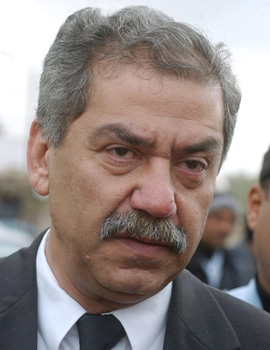With Rowhani’s election, Alusi warns West: do not backslide on Iran

“We have the right to optimistic, but nobody should be naive,” said former Iraqi Parliamentarian Mithal al Alusi today via phone from Iraq concerning Friday’s election of Hassan Rowhani as President of Iran.
The election of Rowhani, reportedly a moderate, is seen by many analysts as a repudiation of Islamist extremists.
Alusi sounded a note of caution. “People in West try to sell this [development] as a new democratic development… ,” he said. “We should be careful what language we use…he is from the Iranian system and [probably] believes in the same goals.”
That said, Alusi added that while he wishes to “give [Rowhani] a chance,” doing so means seeing if Rowhani’s words and actions are truly moderate.
“If he’s ready to say, ‘Israel is not my enemy, I will not eliminate Israel from the planet,’ then there might be reason to talk with the man,” said Alusi.
Israeli Prime Minister Benjamin Netanyahu today warned that international pressure on Iran to halt its nuclear program should not be relaxed in the wake of this election. Alusi, who served twice in Iraq’s Parliament and was elected on a platform that included promoting cooperation between Iraq and Israel, agrees with Netanyahu.
“Netanyau, he has the right to say ‘I need the international community to confirm Iran will give up the language and goals to eliminate my country,’” said Alusi today in an interview from Iraq. “This is his right and I fully agree with him.”
Alusi, a Sunni Arab moderate whose two sons were murdered in 2005 following their father’s trip to attend a counter terrorism conference in Israel, and who has had numerous attempts made on his life for championing normalized relations between Iraq and Israel, cautioned that the institutions and individuals driving the extremism that emanates from Iraq have not changed. “[Supreme Leader Ayatollah Ali] Khamenei is the same, the Iranian intelligence is the same, [and] the Revolutionary Guard is the same.”
International inspectors reported last month that Iran had increased its nuclear production, but probably not crossed the “red line” that Israel’s leaders have declared could trigger military action.
Regarding U.S. plans announced last week to send direct military aid to rebels in Syria, Alusi said he doubts it will change much in Syria, where nearly 100,000 people have died in just over two years. He believes that is because the Assad government receives support from extremist forces in the region including Iran, which also backs Hezbollah. He believes that if the U.S. “want[ed] to stop” the bloodshed the better strategy would be to “stop Hezbollah.”
“The Syrian regime controls the region with 5,000 [Hezbollah] fighters,” he said. “If the [West] wants to stop this, they’d stop Hezbollah.”
This entry was written by Heather Robinson and posted on June 16, 2013 at 4:37 pm and filed under Blog. permalink. Follow any comments here with the RSS feed for this post. Keywords: human-rights, Iran, Iraq, Israel. Post a comment or leave a trackback: Trackback URL. */?>



